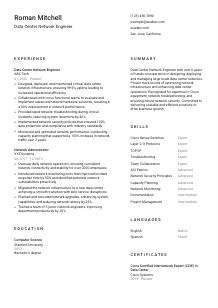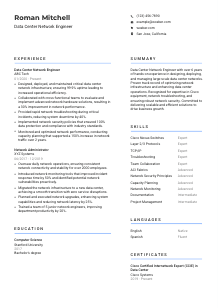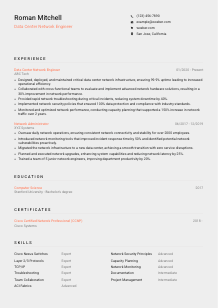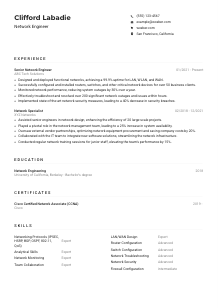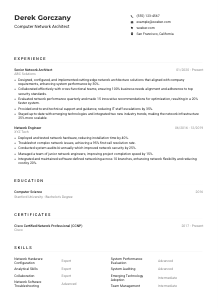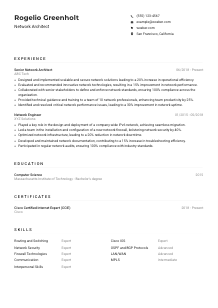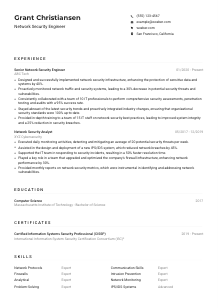Data Center Network Engineer Resume Example
Routing packets, but your resume keeps hitting roadblocks? Explore this Data Center Network Engineer resume example, configured with Wozber free resume builder. See how you can map out your network expertise to align with job frameworks, ensuring your career connectivity is always high-speed and low latency!
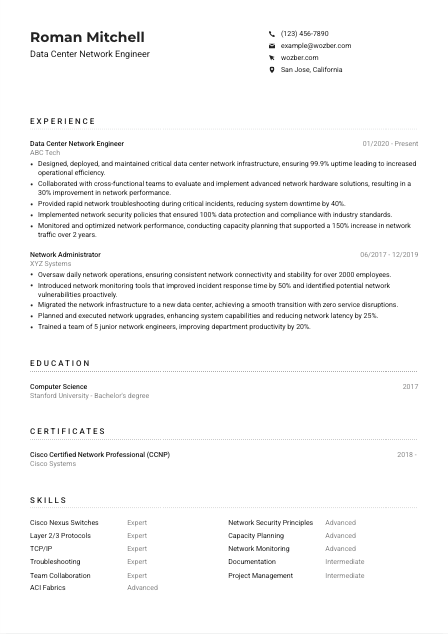
How to write a Data Center Network Engineer resume?
Embarking on your journey to land that coveted Data Center Network Engineer role? In the realm of network infrastructure, where a millisecond can make a difference, your resume must be just as responsive and robust as the networks you aim to engineer. This guide isn't just about writing a resume; it's about crafting a professional beacon that shines brightly in the competitive landscape, tailored precisely to the job description you're targeting.
With the aid of Wozber, a free resume builder specifically designed to conquer the nuances of ATS-friendly resume formats and ATS optimization, let's dive deep into fine-tuning your resume for the Data Center Network Engineer position. Your skillset is unique; let's ensure your resume is too.
Personal Details
First impressions count, especially in the digital age where your resume is your handshake. For a Data Center Network Engineer, this section is your initial packet handshake in the networking conversation. Let's navigate through ensuring this section is not just factual, but a strategic alignment with your professional goals and the specifics of your desired role.
1. Your Name: The Domain Name of Your Brand
Consider your name the hostname of your professional persona. Present it clearly and prominently at the top of your resume. Like a carefully configured DNS record, it should stand out, directing attention to your qualifications.
2. Job Title Alignment: Broadcasting Your Intent
Just below your name, pin your professional title – in our case, 'Data Center Network Engineer'. This not only reflects your current expertise but also echoes the job you're pursuing, forming an immediate connection with the job description.
3. Essential Contact Information: Ensuring a Clear Path
Your contact details are the static routes to reaching you. A professional email (think firstname.lastname@domain.com) and a reliable phone number are non-negotiable. Double-check for accuracy; you don't want misrouted inquiries.
4. Localizing Yourself: Geographic Configuration
Location can be pivotal. Stating "San Jose, California" as in our example, affirms your proximity or willingness to be located near the data center, aligning with the job's geographic requirements and eliminating any relocation doubts at the outset.
5. Professional Profiles: Extending the Network
Including a LinkedIn profile or a personal portfolio site can act as a gateway to more about you, akin to an extended discovery protocol. Ensure it's updated and reflects the professionalism of your resume.
Takeaway
Your 'Personal Details' section is your network handshake, setting the tone of the professional dialogue. It's the first step in ensuring your resume is accessible, direct, and precisely optimized for the Data Center Network Engineer role.





Experience
In the core of every data center lies its network, meticulously engineered to handle vast loads with efficiency and security. Let's parallel this ethos to curate your experience section. It's here you demonstrate your hands-on capability to design, deploy, and manage networks that meet and exceed requirements. Drawing on the essence of the job description, we will map out your professional journey, showing how you've not only met but mastered the demands of previous roles.
- Designed, deployed, and maintained critical data center network infrastructure, ensuring 99.9% uptime leading to increased operational efficiency.
- Collaborated with cross‑functional teams to evaluate and implement advanced network hardware solutions, resulting in a 30% improvement in network performance.
- Provided rapid network troubleshooting during critical incidents, reducing system downtime by 40%.
- Implemented network security policies that ensured 100% data protection and compliance with industry standards.
- Monitored and optimized network performance, conducting capacity planning that supported a 150% increase in network traffic over 2 years.
- Oversaw daily network operations, ensuring consistent network connectivity and stability for over 2000 employees.
- Introduced network monitoring tools that improved incident response time by 50% and identified potential network vulnerabilities proactively.
- Migrated the network infrastructure to a new data center, achieving a smooth transition with zero service disruptions.
- Planned and executed network upgrades, enhancing system capabilities and reducing network latency by 25%.
- Trained a team of 5 junior network engineers, improving department productivity by 20%.
1. Dissecting the Job Requirements
Begin your resume crafting quest by parsing the job listing like you would a complex network configuration. For instance, the job calls for expertise with Cisco Nexus switches and ACI fabrics. Highlight every element of your past roles where you've shone in these areas.
2. Structured Chronology: Your Professional Timeline
Organize your roles from the most recent backward, akin to how you would trace network packets to their source. This layout helps recruiters quickly understand where you're coming from and where you're headed.
3. Achievement-Packed Statements: Showcasing Impact
Each role you list should vividly express how you've made a difference, mirroring the job requirements. Using statistics can be powerful, akin to showing high throughput in network performance metrics – for example, 'Enhanced operational efficiency by ensuring 99.9% network uptime'.
4. Quantification of Success: The Metrics that Matter
Numbers speak volumes in our field. Highlighting that you increased network performance by 30% is like upgrading the bandwidth of your professional achievements – it shows measurable impact.
5. Relevance is Key: Filter Out the Noise
In networking as in your resume, unnecessary information is like packet loss; it hinders performance. Focus solely on experiences that speak directly to the job's requirements to maintain a high signal-to-noise ratio.
Takeaway
The 'Experience' section is where you broadcast your professional frequency. It's a blend of precision, quantifiable achievements, and a clear narrative that aligns harmoniously with the Data Center Network Engineer role. Channel this mindset to curate an experiential journey that resonates with your future employer.
Education
In the blueprint of your career, education forms the foundation. For a Data Center Network Engineer, stepping into this role with a solid base in Computer Science or a related field isn't just beneficial; it's imperative. Let's architect this section to not just list your educational qualifications, but to underscore their relevance and impact.
1. Highlighting the Backbone
Directly parallel your degree with the job requirement. If the role seeks a Bachelor's in Computer Science and that's what you have, make it unmissibly clear, as this is the primary structure upon which your qualifications are built.
2. Simple yet Effective Presentation
Keep this section clean and straightforward. A cluttered layout is like a poorly designed network topology – it hampers understanding and flow.
3. Degree Specifics: Tailoring to Fit
If your degree perfectly matches the job requirements, make sure it shines. Conversely, if your educational background is in a related field, elucidate how it equips you with a unique perspective or relevant skills for the Data Center Network Engineer role.
4. Coursework and Projects: Extra Credentials
Especially for recent graduates or those in early career stages, listing relevant coursework or projects can add depth to your resume, much like a robust network protocol stack adds functionality beyond the basic transport layer.
5. Additional Achievements: The Enhanced Protocol
Graduating with honors, participating in relevant tech clubs, or involvement in projects that mirror real-world network engineering challenges show initiative and dedication, adding extra layers to your professional profile.
Takeaway
Your education section is the foundational layer of your resume, reflecting both your technical knowledge and your dedication to your career path. It sets the stage for everything that follows, establishing you as a thoroughly qualified candidate for the Data Center Network Engineer role.
Certificates
In the network engineering world, certifications are like the protocols that ensure your expertise is recognized and trusted across the industry. They vouch for your skills, keeping you competitive and often ahead in the evolving tech landscape. For a Data Center Network Engineer, certain certifications can set you apart, signaling your dedication to staying at the forefront of your field.
1. Distilling the Essentials
Revisit the job listing and extract certification requirements. Noting that our example calls for Cisco Certified Network Professional (CCNP) or Cisco Certified Internetwork Expert (CCIE) in Data Center underscores the importance of these certifications in your resume.
2. Prioritizing Relevance
When you're listing your certifications, do so in a way that the most relevant and recent ones take precedence. This immediate signaling is much like prioritizing traffic on a network – it ensures the most important information is seen first.
3. Chronological Clarity
State the dates acquired for each certification, clarifying your current level of knowledge and its relevance. It's a signal to the hiring manager of your up-to-date expertise, crucial in the fast-evolving tech sector.
4. Continuous Learning
The tech field is ever-evolving, with new advancements around every corner. Highlight your commitment to continuous learning and staying current in your field. This readiness for growth and adaptation is key to thriving as a Data Center Network Engineer.
Takeaway
Your displayed certifications are more than achievements; they're a testament to your dedication and capability within the network engineering field. Tailor this section with precision, showcasing those that align most closely with the requirements and preferences of your dream Data Center Network Engineer role.
Skills
The skills section of your resume is where you get to dial in the specifics about what you bring to the table. For a Data Center Network Engineer, this is your chance to highlight those hard and soft skills that make you the ideal candidate for the role. Let's optimize this section, ensuring it's primed for ATS-friendly resume format, while also engaging the human readers on the other side.
1. Parsing the Job Description
Initiate by extracting both the explicit and implicit skills the job description emphasizes. This role, for instance, requires proficiency with Cisco Nexus switches and a strong understanding of network security principles. Treat these as your keywords for ATS optimization.
2. Mirroring with Precision
Match your skills with the job's requirements. If 'Cisco Nexus Switches' and 'TCP/IP' are listed, and you're adept in these areas, make them prominent. This alignment is essential for passing through ATS filters and catching the hiring manager's attention.
3. Organized Excellence
Resist the temptation to list every skill you possess. Focus on those most pertinent to the job at hand. A cluttered skill section can dilute your core competencies. Think of it like efficient network design – every element has its purpose and place.
Takeaway
Your 'Skills' section is a strategic array of your professional capabilities, precisely matched to the job's requirements. It communicates to both the ATS and the hiring manager that you are equipped with the necessary tools to excel as a Data Center Network Engineer. Showcase them confidently, focusing on relevance and clarity.
Languages
As a Data Center Network Engineer, the ability to communicate effectively in multiple languages can be a definitive asset, especially in multinational corporations or roles involving cross-border collaborations. This section is a window to your versatility and adaptability in a globalized work environment. Let's curate it in a way that adds significant value to your resume.
1. Assessing Job-Specific Needs
First, identify if the job posting specifies a requirement or preference for certain languages. For our example, proficiency in English is a must. This becomes our primary language to highlight.
2. Highlighting Your Linguistic Portfolio
Start with the languages most relevant to the job, assigning proficiency levels (Native, Fluent, Intermediate, Basic) to each. For a position in California, including Spanish can offer an advantage, indicating an ability to engage with a broader demographic.
3. Including Additional Languages
Even if not requested, other language proficiencies can underscore your ability to thrive in diverse environments, adding layers to your candidacy much like varied protocols enhance network functionality.
4. Honesty in Proficiency
Be truthful about your language skills. Overstating your proficiency can lead to awkward situations, akin to a routing loop in network terms – it's confusing and counterproductive.
5. Role-Related Considerations
Think about the scope of the role. For positions emphasizing team collaboration or international projects, your multi-language proficiency can be particularly appealing, showing your readiness for global engagement.
Takeaway
The 'Languages' section, while sometimes overlooked, is a powerful testament to your ability to navigate and thrive in a global context. Highlight your linguistic skills with clarity and honesty, positioning yourself as a culturally adept candidate ready for the dynamic demands of a Data Center Network Engineer role.
Summary
The summary is your resume's transmission control protocol; it initiates the conversation, ensuring a reliable handshake between your professional narrative and the hiring manager. Here, you encapsulate your expertise, aligning directly with the core requirements of the Data Center Network Engineer position. Let's distill your career into a powerful, concise narrative.
1. Dialing into the Job's Essence
Kickstart by fully absorbing the job description. This role, for instance, revolves around the design, deployment, and management of data center networks. This is the nucleus around which your summary orbits.
2. Concise Introduction
Begin with a statement that positions you within your profession – a seasoned Data Center Network Engineer in this case. This sets the stage, signaling your role-specific expertise right off the bat.
3. Reflecting on Key Achievements
Pinpoint a few standout skills and accomplishments, particularly those mirroring the job description. Highlight your adeptness with Cisco Nexus switches, or your experience ensuring network uptime, to resonate with the role's demands.
4. Brevity with Impact
Keep it sharp and significant. In 3-5 lines, distill the essence of your career, ensuring every word contributes to a compelling synopsis of why you're the ideal candidate for the Data Center Network Engineer position.
Takeaway
Crafting an engaging summary is like configuring an efficient network – it requires thoughtful structuring, prioritization, and clarity of communication. As your resume's introductory handshake, make it memorable, clearly emphasizing your alignment with the Data Center Network Engineer role. This is your first step to ensuring your resume not only passes through ATS scans with an ATS-friendly resume template but also captivates the human reader behind the screen.
Launching Your Data Center Network Engineer Journey
Congratulations on completing this detailed walkthrough! With your resume now meticulously tailored to the Data Center Network Engineer position, you're ready to traverse the job market with confidence. Remember, your resume is a dynamic document that evolves with your career. Regularly revisit and refine your content, ensuring it remains optimally aligned with your professional aspirations and the landscape of opportunities.
Equip yourself with Wozber's free resume builder, leveraging ATS-friendly resume formats and the ATS resume scanner for unparalleled optimization. The future is a network of possibilities – go ahead and make your mark!

- Bachelor's degree in Computer Science, Information Systems, or a related field.
- Minimum of 5 years of hands-on experience in designing, deploying, and managing large-scale data center networks.
- Proficient in working with Cisco Nexus switches, ACI fabrics, and other data center network equipment.
- Strong understanding of Layer 2/3 protocols, TCP/IP, and network security principles.
- Relevant certifications such as Cisco Certified Network Professional (CCNP) or Cisco Certified Internetwork Expert (CCIE) in Data Center.
- Proficiency in English is key.
- Must be located in San Jose, California.
- Design, deploy, and maintain data center network infrastructure to ensure high availability, scalability, and performance.
- Collaborate with cross-functional teams to evaluate, test, and recommend new network hardware and software solutions.
- Handle network troubleshooting and provide resolution for network-related issues in the data center environment.
- Implement and enforce network security policies to ensure data protection and compliance with industry standards.
- Regularly monitor network performance and conduct capacity planning to address future network needs.





